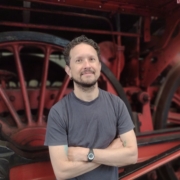Dr Guilherme Pozzer is a historian with a background in Industrial Heritage and Industrial Archaeology, with an extensive international academic background spanning Brazil, Portugal, Spain, Germany, and the UK. His research interests encompass Industrial Heritage, Memory, Industrial Archaeology, Urban History, and Social History. He has expertise in qualitative research methodologies, particularly in analysing historical data from an Industrial Archaeology perspective combined with Social Semiotics and the hermeneutic framework.
His PhD thesis examines a partially abandoned industrial site in Portugal to explore the role of its material culture and its symbolic and social significance in processes of memory-making and heritage-making. His MPhil dissertation investigates the urban impacts of a railway station in Brazil and the transformation of its symbolic significance over time, from its original function to a preserved heritage site, and finally its conversion into a cultural centre following the discontinuation of railway traffic.
Currently, as a Teaching Associate in the Department of Archaeology at the University of Sheffield (UK), he coordinates modules on Digital Cultural Heritage and Digital Mapping for the Humanities. His current research centres on community and arts-based approaches to understanding the connections between Industrial Heritage, memory-making practices, and well-being in the context of deindustrialisation.
Recently, he published the book “Words in Ruins” (Palavras em Ruínas. Lisbon: Astrolábio Edições, 2022), which creatively explores industrial heritage through writing and digital illustrations, delving into themes of memory and the transformative nature of ruined industrial spaces.
Project statement
Memories, identities, and wellbeing in post-industrial communities
Particularly in post-industrial contexts, communities are frequently put aside in decision making processes concerning their own heritage and are excluded as active social subjects in processes of heritage making that should compose its own identity and to which their memories are connected. In this regard, there is also a gap in Industrial Heritage studies regarding the impacts of these processes on community wellbeing. Thus, my research addresses how current uses and different levels of community engagement with industrial heritage contributes to build practices of memory making and identity making and their impacts on communities’ wellbeing in contexts of deindustrialization through case studies in Europe. This will provide the proper European context on the relationship between communities and heritage institutions of reference by asking how deindustrialized heritage sites have been used, managed, and preserved while simultaneously considering the perspective of post-industrial communities’ inclusion in the process of heritage making and conservation.





